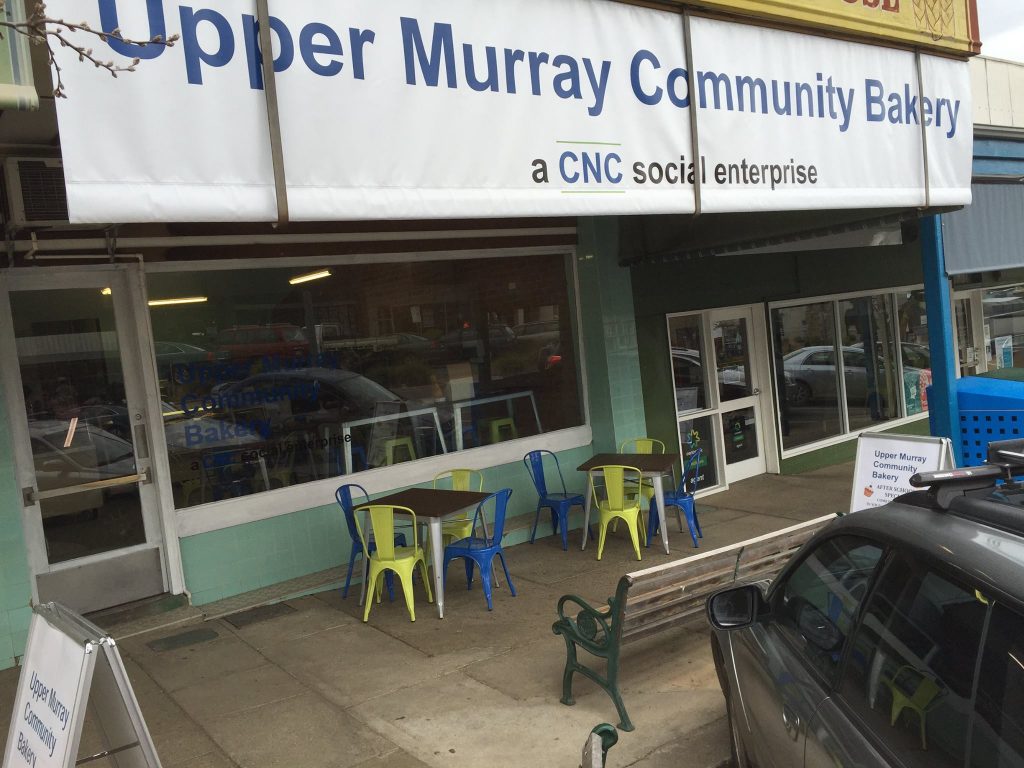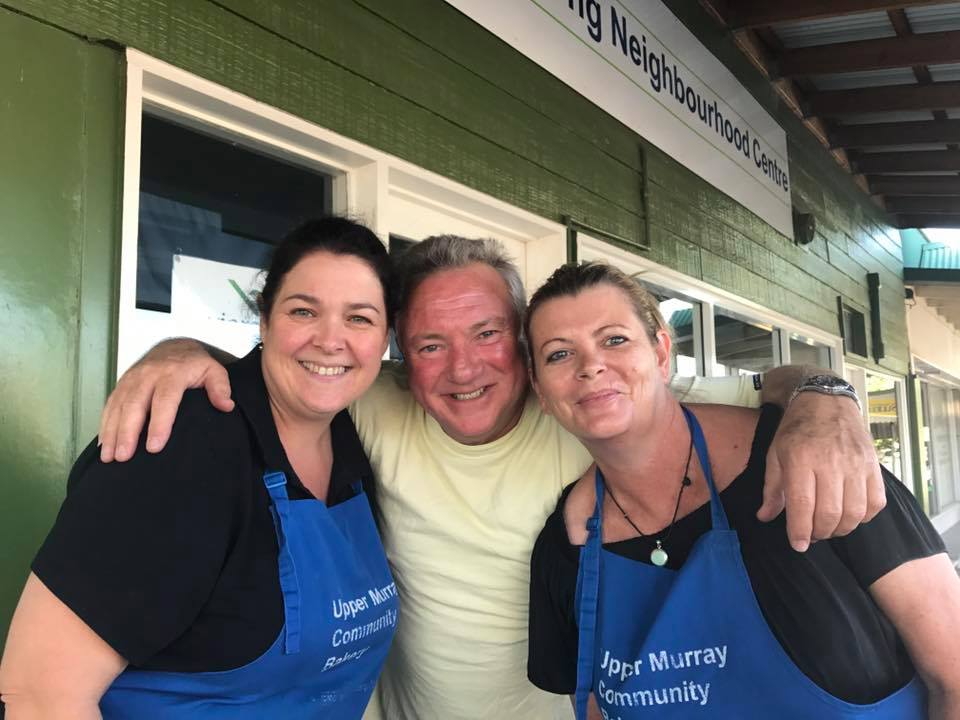Foundation for Rural & Regional Renewal (FRRR)
The Fremantle Foundation was established in 2010, and seeks to create a thriving community through local giving and to address critical community needs by providing inspiring ways for people to give. They partnered with FRRR in 2020 through a Community Foundation Account, allowing them to support a wider range of community organisations conducting charitable activities in rural and regional WA, particularly those without their own DGR status – which is the majority of community organisations in regional and remote areas.
In FY23, for the second year in a row, the Foundation distributed grants exceeding $1 million across 62 grants, creating impact in the local Fremantle community, the broader metropolitan area, regional and remote WA, as well as in other parts of Australia.
While most of their donors focus on metropolitan areas, the FRRR Community Foundation Account specifically allows the Fremantle Foundation to support more projects in regional communities.
For example, the Northhampton community, located around five hours north of Fremantle, was badly affected by Cyclone Seroja in April 2021. A group of ex and current AFL footballers, all from around Northampton, set up a fund with Fremantle Foundation to support rebuilding in the township and the surrounding region.
Two projects that have been completed to date include the refurbishment of the Olgilvie Hall and construction of a remembrance garden at St Mary’s School. The garden includes new paving, bench seating and a selection of plants, including the much-loved rose garden. In addition, signage has been installed for visitors to gather and learn about the parish and impact of Cyclone Seroja.
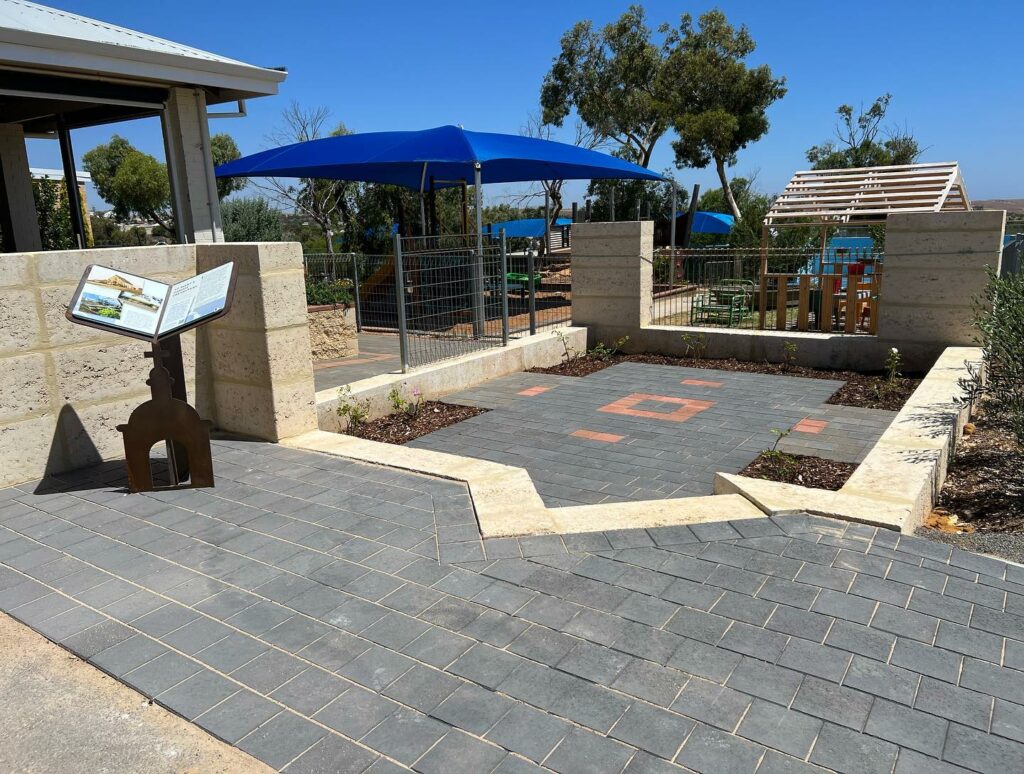
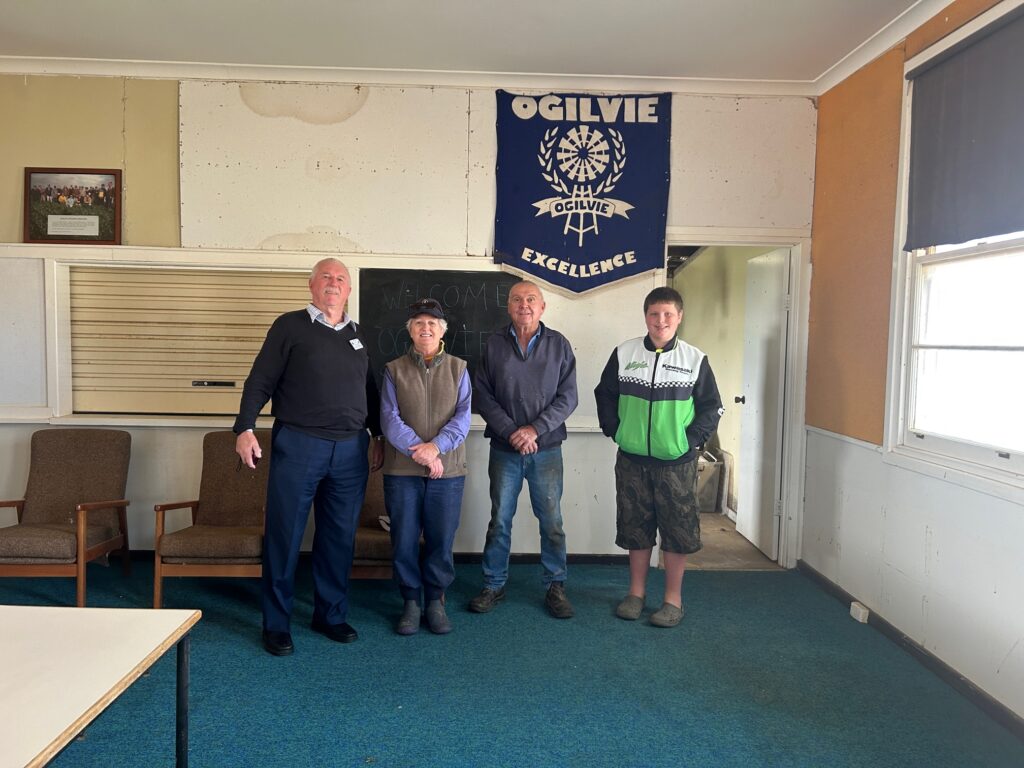
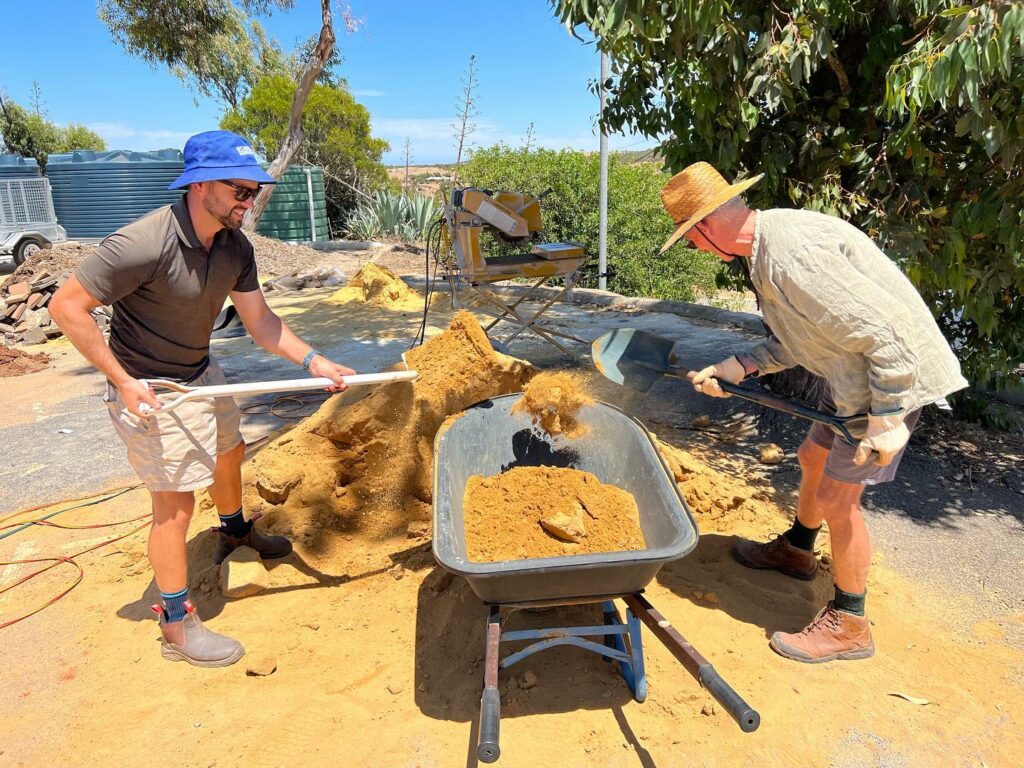
The Fremantle Foundation is also using their FRRR Community Foundation Account to ensure donated funds support the launch of the Peel Community Fund.The Fund was established in 2019 by members of the Peel community, with the aim of creating their own Community Foundation in the region. Thanks to their FRRR Account, Fremantle Foundation was able to award them a grant to support the development of critical infrastructure, including a website, communication and marketing plan, marketing materials, operational structure, committee governance and membership / giving structures.
In another example of their ability to inspire local giving, The Esperance Ag Fund was established in 2021 by the local agricultural sector in partnership with Fremantle Foundation, with the sole purpose of making a difference within the Esperance community. Collectively, the farming community, which is about 700 km from Fremantle, provides support to the wider Esperance region by funding projects that make a positive impact. They’ve recently awarded a grant to the Recherche Aged Welfare Committee for the installation of a reticulation system at the Alchera Aged Care Housing property.
Pauline Eves from Fremantle Foundation said they are most grateful for the assistance provided by FRRR to enable grants like these to happen.
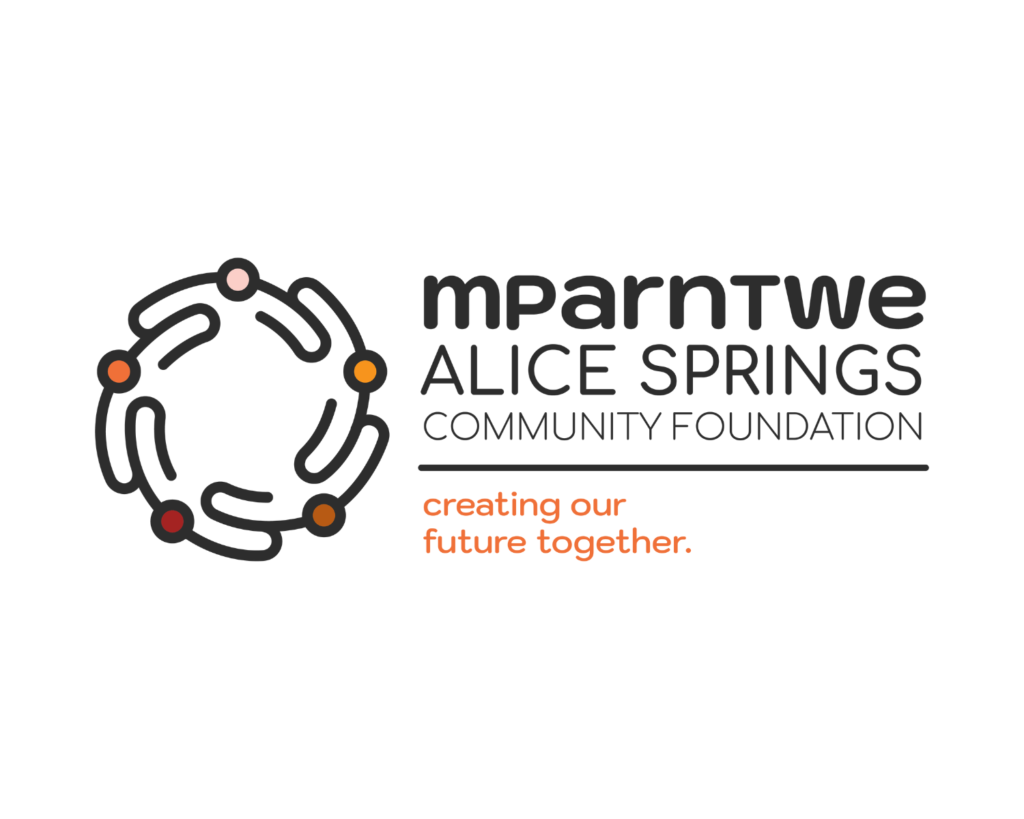
A new community foundation has been established in Alice Springs to build capabilities, connections and encourage positive community conversations and action. Mparntwe Alice Springs Community Foundation’s (MASCF) first project was to bring back a printed weekly newspaper.
Professor K. Hess, researches and writes about the importance of local newspapers in the regions.
“It is widely acknowledged that local news outlets perform vital functions in regional and rural communities, including informing, educating and entertaining a public that is often marginalised in favour of their big-city counterparts; providing a forum for public debate; creating a shared sense of community; and fulfilling a watchdog role by providing a check and balance on institutions such as local government, courts, churches, schools and police.”
Alice Springs hasn’t had a local newspaper since News Corp ceased printing the Alice Springs-based Centralian Advocate in 2020. Fully aware of the challenges facing newspapers that are struggling all around regional Australia, the Foundation invited established newspaper operator Today News Group to provide support to help ensure the long-term success of the publication. On 24 August – less than two months after the Foundation was formed – the first edition of The Centralian Today hit the stands!
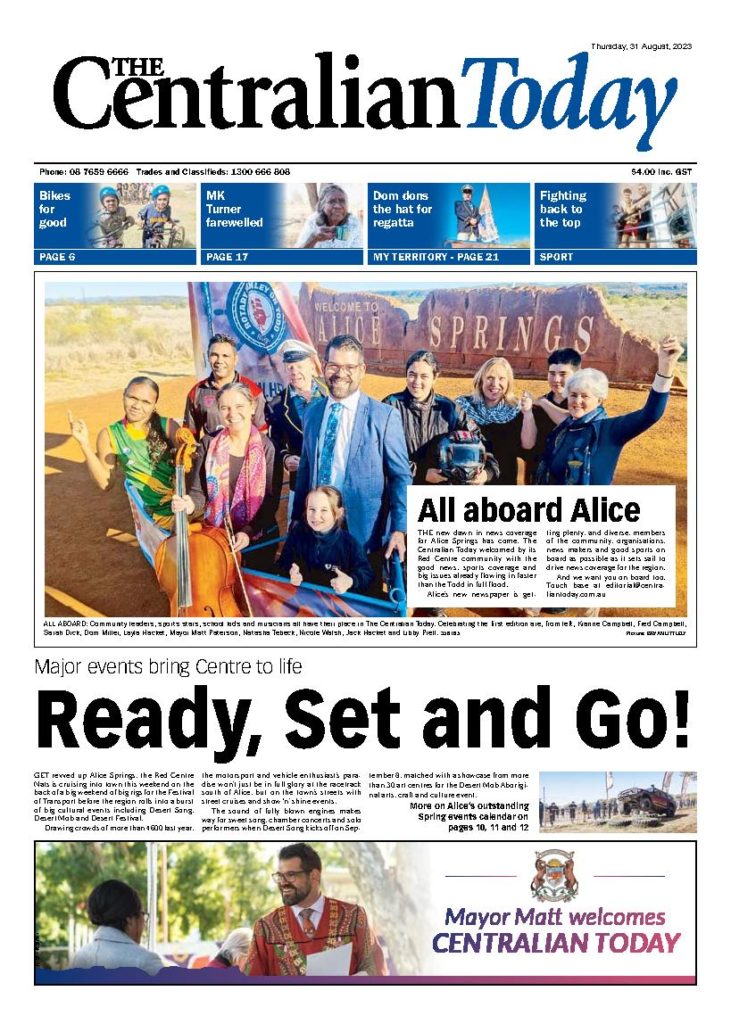
Libby Prell, Chair of the Foundation, said the community desperately needed a newspaper.
“Alice Springs is an incredible place but we have significant challenges that can erode our connectedness, community and sense of shared future.
“A trusted newspaper that reflects our whole community is essential for a stronger community”, she said. “Having a newspaper in town provides the platform for community engagement and shared effort to make our town the place we all want it to be,” said Ms Prell.
“It is early days for the Foundation, and there’s much to do to realise its potential to encourage and support positive change in Alice Springs”, said John Huigen, Executive Director of the Foundation, said. “The first major milestone is the newspaper’s first edition, but people will hear a lot more about the Foundation as we move forward.”
If you’d like to support their work, Mparntwe Alice Springs Community Foundation holds a Community Foundation Account with FRRR to help them fundraise.
Community Foundations are place-based organisations that are deeply connected to their communities and offer excellent opportunity to invest in activities prioritised by their people in rural and regional areas. The community foundation sector continues to grow across the country now with around 40 Foundations bringing focus and support for local issues, challenges and opportunities.
“The NRCF Board and staff certainly value the long-term relationship with FRRR, which is so important to us as a rural and regional Foundation. The support for NRCF’s community impact and grants team has been essential to achieve impact in the community.” Sam Henderson, CEO, NRCF
Northern Rivers Community Foundation (NRCF) was established in 2004 to connect people who care with local causes that matter, to improve community wellbeing for the Northern Rivers region of NSW. They have one of the largest footprints of any community foundation in Australia, covering from Tweed to Grafton, from the ocean all the way up past Kyogle, Woodenbong and Casino. NRCF is dedicated to improving the lives of those less fortunate in their community, either from economic circumstances, mental illness, disability, learning difficulties or drug / alcohol addiction. More recently their focus has been to support their community to navigate their disaster recovery journey following bushfires and then widespread flooding events across the region in early 2022.
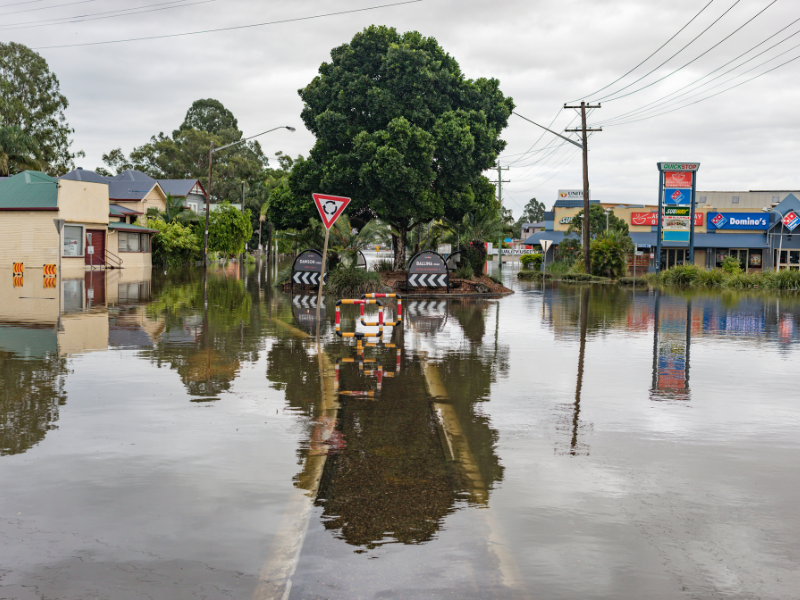
NRCF has held a Fundraising Account partnership with FRRR since 2017 to attract tax-deductible donations, enabling them to help community organisations meet increasing demands on their services and work together to build resilience across the community.
Initially they raised funds through a general Community Fund, and in 2020 established the Resilience & Regeneration Fund to raise funds specifically to support disaster recovery and preparedness in their region. The Fund responds to the increasingly frequent natural disasters affecting the region and the global pandemic. Recognising that these are not isolated events, and that resilience and regeneration are integral to a sustainable and prosperous region, they wanted to attract as much money as possible.
As at 30 June 2023, NRCF has raised $1,171,600 via these two Funds. In 2022, they announced a record distribution of $327,177 to 49 recipients across the seven LGA’s of the Northern Rivers. This was supported by distributions totalling more than $162,000 from their FRRR Fundraising Account in FY22. Projects span across disadvantage, housing and homelessness, recovery and resilience, and the environment.
NRCF will also be looking to use the funds raised through the Resilience & Regeneration Fund to respond in a meaningful and impactful way to the devastation brought about by the two 2022 flooding events that occurred in quick succession through their Annual Community Grants program. Informing their response is their ongoing research project to understand the issues and conditions impacting community recovery with a view to better support local not-for-profits and their activities into the future. In May 2023 they released their second flood impact report ‘Research, Respond, Recover: A year on from disaster’ which offers valuable insights across a range of indicators about how the community is recovering. It highlights gaps in funding for medium to longer term recovery, and ongoing key issues of concern around health and wellbeing, housing and homelessness.
With this increase in support comes a need for increased resourcing. Fortunately, NRCF has also received donations via their Fundraising Account specifically to support their operational and staffing costs through their General Fund. As a result, the role of Grants and Community Impact Manager has been introduced, which will boost their capacity, enabling them to expand their community grant programs and supporting them to broaden their reach.
Sam Henderson, NRCF’s CEO, said ‘The NRCF Board and staff certainly value the long-term relationship with FRRR, which is so important to them as a rural and regional Foundation. The support for NRCF’s community impact and grants team has been essential to achieve impact in the community.’ The need to respond to disasters has now increased so much that they’ve also recruited a part-time Grants Administration Officer to support the Community Impact Manager.
The community of Corryong in north-eastern Victoria is nestled at the foot of the surrounding mountain ranges, and has a population of around 1,200. The Corryong Neighbourhood Centre (CNC) is very active in the community, and their mission is to make a difference for people in their community by providing a vibrant hub of lifelong learning that brings people together, connects them with services, programs, employment and activities and points them in the right direction.
The CNC operates two successful social enterprises, which not only increase the opportunities for work-based training in the community and support the ongoing operating costs of the CNC, but also meet an identified gap in current services and supplies available in Corryong.
One is a community bakery, which had an 11% increase in sales in its first year and a 28% increase in its second, contributing over $83,000 to CNC operations in its first two years of trading. The second social enterprise venture is a community garage, which uses the same model as the bakery and aims to be financially viable and self-sustaining within a reasonable timeframe. Both ventures are managed by an experienced industry professional with training skills and a community focus with business and administrative support from the CNC team.
To ensure that the funds generated from the social enterprises are sustainably and effectively utilised within the Upper Murray, the Upper Murray Innovation Foundation (UMIF) was established as a Community Foundation operated by the CNC in June 2016. UMIF partnered with FRRR in 2017 to create a Fundraising Account to channel these funds through, meaning that any contributions made to the account receive a tax deduction within Australia. UMIF’s purpose is to support the activities of the CNC and the wider Upper Murray Community through learning, activities and initiatives that improve life in the region and, particularly since the devastating Black Summer bushfires, build resilience and growth at the community level.
Since opening the account with FRRR, UMIF has raised $333,462 for bushfire recovery and $245,000 for their community garage social enterprise. Distributions are made to support community groups such as the footy clubs at Bullioh, Federal, Cudgewa and Corryong, which were adversely affected by the Black Summer bushfires. Corryong College received funding for a support dog; Cudgewa Hall for tree works; the Corryong CRC for the development of a community calendar; Biggara Recreation Reserve for community hall upgrades; and a Freemasons project to assist with the clearing of damaged fencing, erosion and damage to waterways resulting from the bushfires and subsequent landslides in difficult access areas.
Sara Jenkins from UMIF said that the funded activities have provided stand alone benefits, start up funds or contributed to larger projects for a wide range of groups. Some of the distributions have also enabled groups and organisations to work together to develop strategies and solutions to address wider community issues (e.g. the community calendar project).
When asked what some key learnings were for the Community Foundation, Sara mentioned the ongoing importance of developing and using comprehensive procedures and documentation and maintaining regular contact with recipients and partners.
“Keeping up-to-date with the status of projects, the people on the ground, and being involved in any problem solving or amendments required reduces confusion, duplication and helps the process run smoothly, despite ongoing delays,” she said.
UMIF continues to foster several project partnerships, working closely with Freemasons Victoria, Towong Shire, CRCs and various unincorporated community groups. They are also auspicing and supporting a number of bushfire recovery grants and projects for unincorporated community groups that will support the community to continue the recovery process.
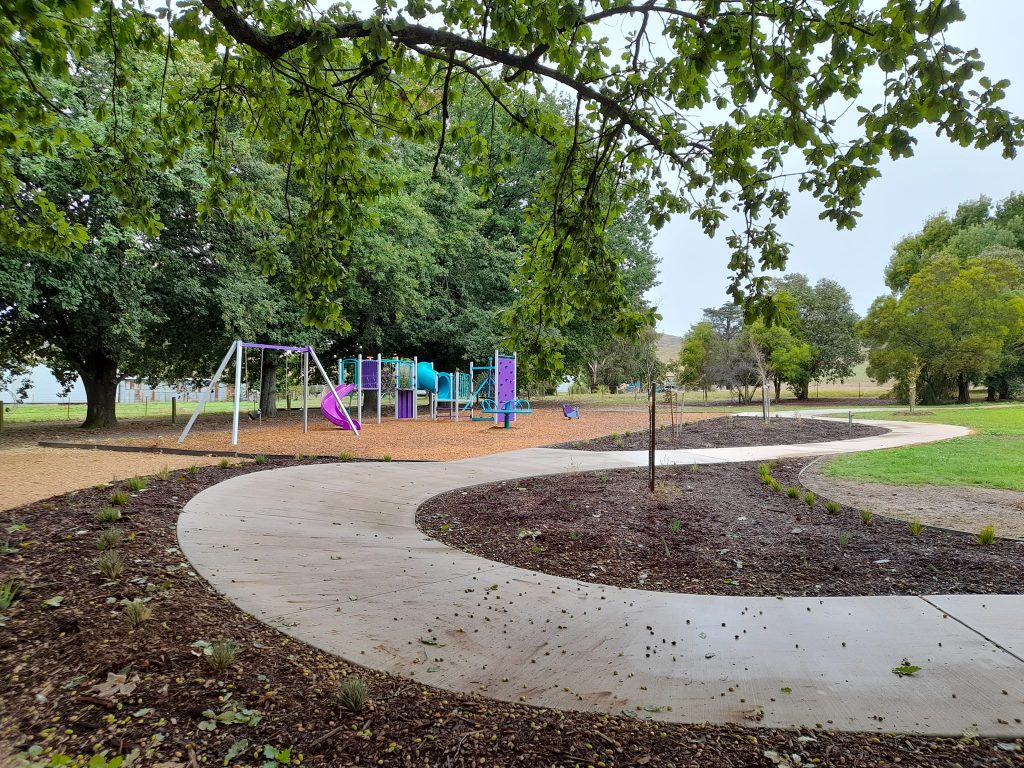
Cudgewa Park. 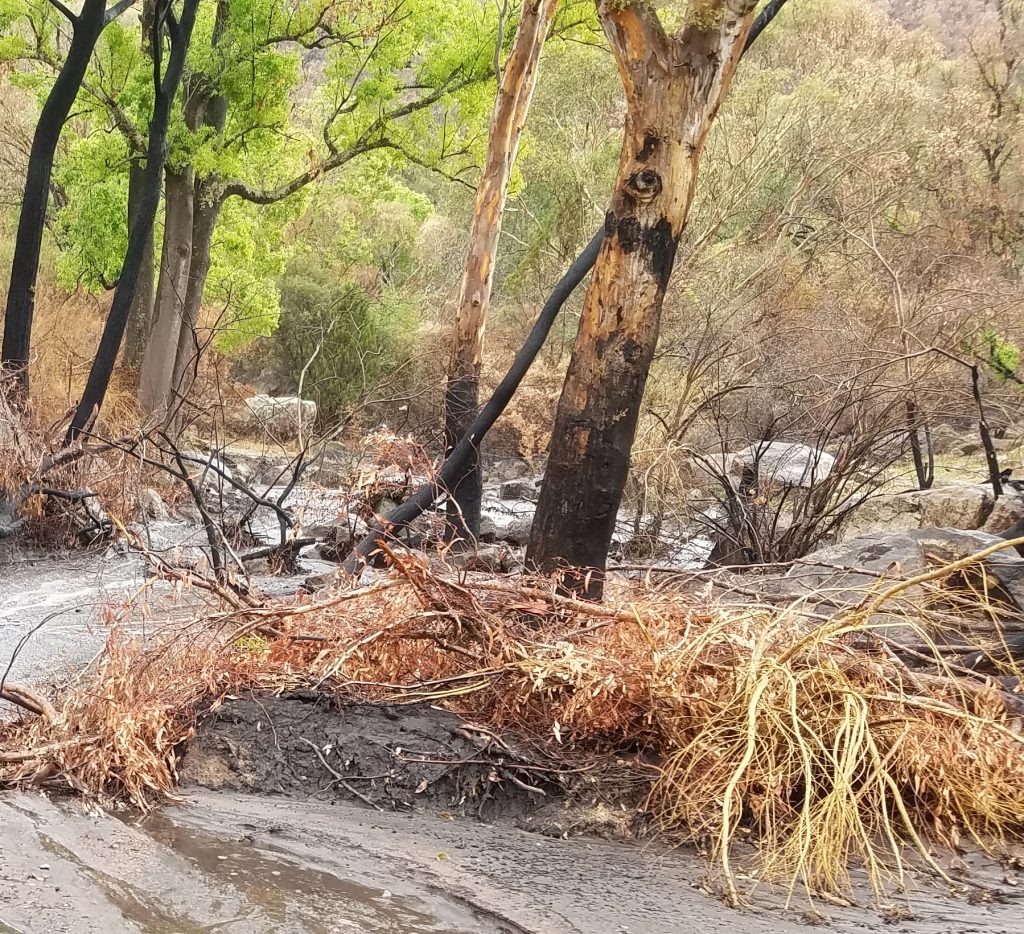
Freemasons fencing project. 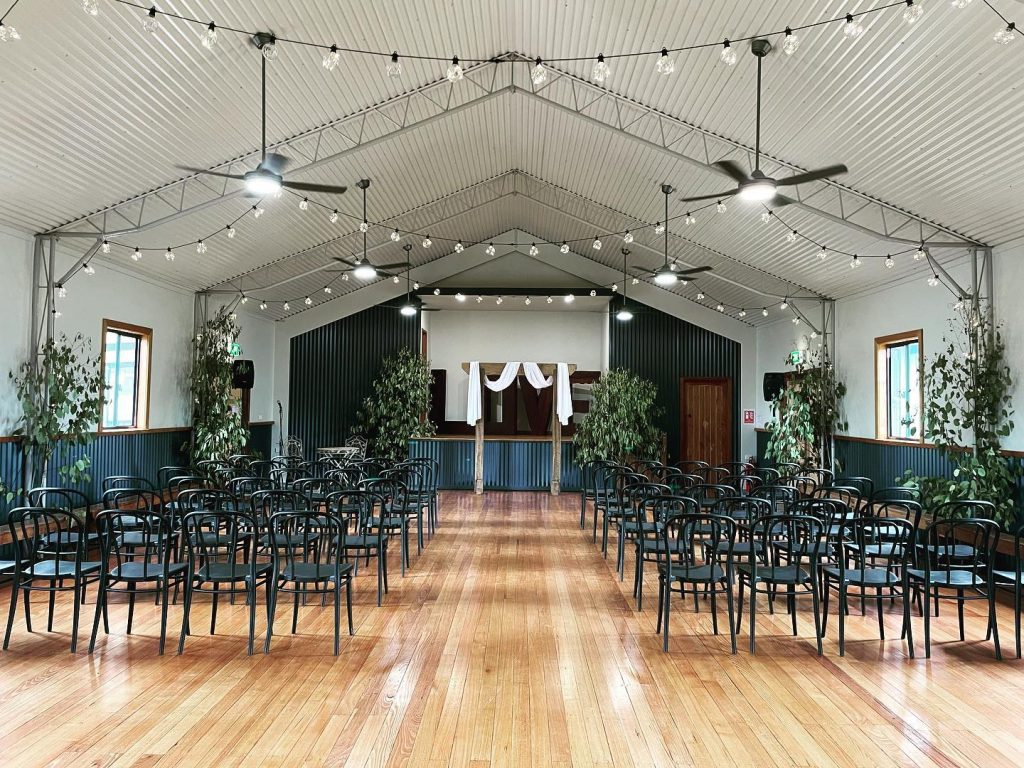
Thowgla Hall post renovations.
FRRR has today welcomed the extension of DGR-1 status for the country’s Community Foundations, in particular those in regional areas, which was confirmed in Tuesday night’s Budget announcements. This special status means that from 1 July, they can directly receive tax deductible donations from a broader range of donors to support more place-based philanthropy, which FRRR has long-championed.
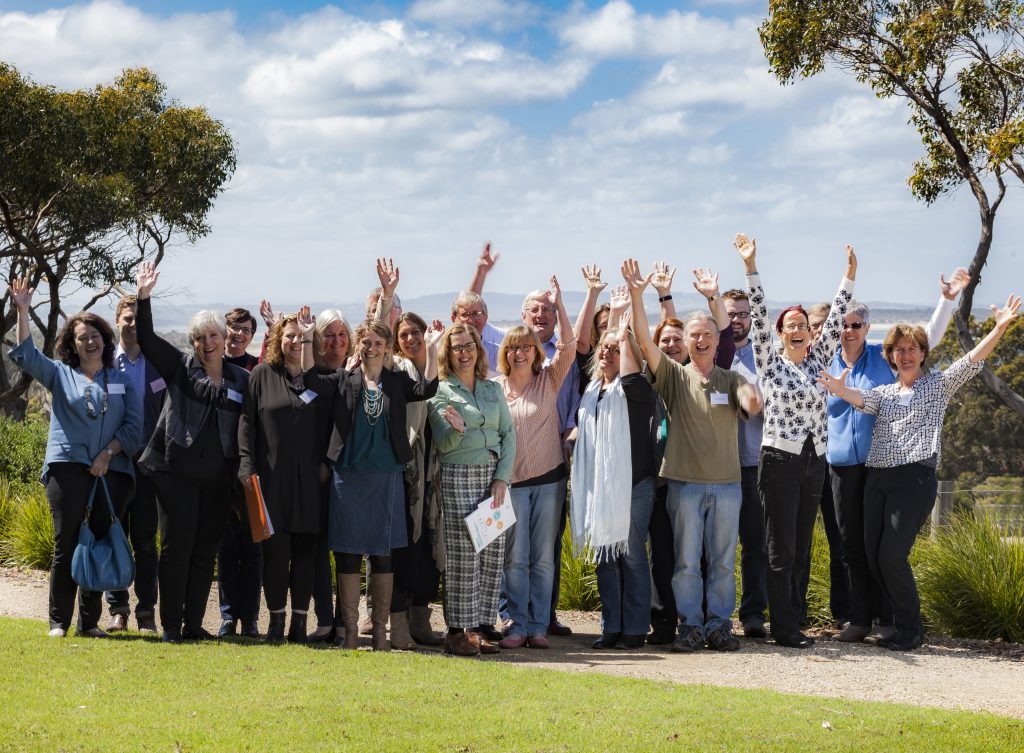
Place-based approaches are critical, especially given the compounding impacts of back to back disasters and the challenges and opportunities in each community. They allow local people to prioritise resources to deliver outcomes that they know will make the most impact, taking account of the unique circumstances of every place.
For the rural and regional communities that have a local Community Foundation that is a member of Community Foundations Australia, this legislative change will mean that they will soon be able to directly accept tax deductible donations to channel toward their local community needs, as well as give to local community organisations that do not have DGR-1 status.
FRRR CEO, Natalie Egleton, says that this reform paves the way for much-needed additional local giving, and that FRRR will continue to support rural communities across Australia to address local and regional issues.
“FRRR was established in 2000 through a partnership between the Australian Government and philanthropy to facilitate long-term and flexible funding to reach and stay in remote, rural and regional communities. In fact, we were set up to address many of the issues raised in the Pride of Place Inquiry, which recommended this DGR extension. We have long championed the important role of place-based philanthropy and indeed, have channelled more than $135 million to in excess of 12,000 projects to support local projects in remote, rural and regional Australia.
“Of this, more than $22 million has gone to support Community Foundations, with some $6 million via the 22 Community Foundations that we have partnered with through a Community Foundation Account. We are proud to have been able to help these Foundations raise and distribute those funds, and to have played a key role in the establishment, development, and promotion of the sector as a whole. We welcome this legislative reform, which will enable even more funding to be channelled locally,” Ms Egleton said.
Over the coming months, FRRR will work closely with the 19 Community Foundations that currently hold Community Foundation Fundraising Accounts and are in a position to take advantage of this legislative reform.
“FRRR will continue to back regional Community Foundations and to facilitate funding and collaborations for other remote, rural, and regional not-for-profits and community groups to advance resilient, vibrant, sustainable regional communities. Our role in connecting resources and supporting the capacity of local leaders and not-for-profit organisations, and having a long-term focus in our work, will remain a key pillar of FRRR’s work.”
Community Foundations Australia commented that “FRRR has been the engine room for the development of Community Foundations in regional Australia, where four out of five of these Foundations operate. This reform may change how we work with each other, but it does not change our shared ambition of working together to support regional community development. Our sector as a whole very much looks forward to building on our well established relationship with FRRR for mutual benefit.”
For more information on the services that FRRR offers, visit www.frrr.org.au.
Gunaikurnai Country
The Mirboo North and District Community Foundation (MNDCF) was set up in 2010 to strengthen their community. Serving Mirboo North and surrounding rural townships, two hours southeast of Melbourne, they embody their mission statement of building strong community through giving, facilitating and investing.
Their partnership with FRRR, through a Community Foundation Fundraising Account established in 2018, has helped them fund numerous community organisations and projects in the area, including buildings – all in the name of a cohesive and flourishing community.
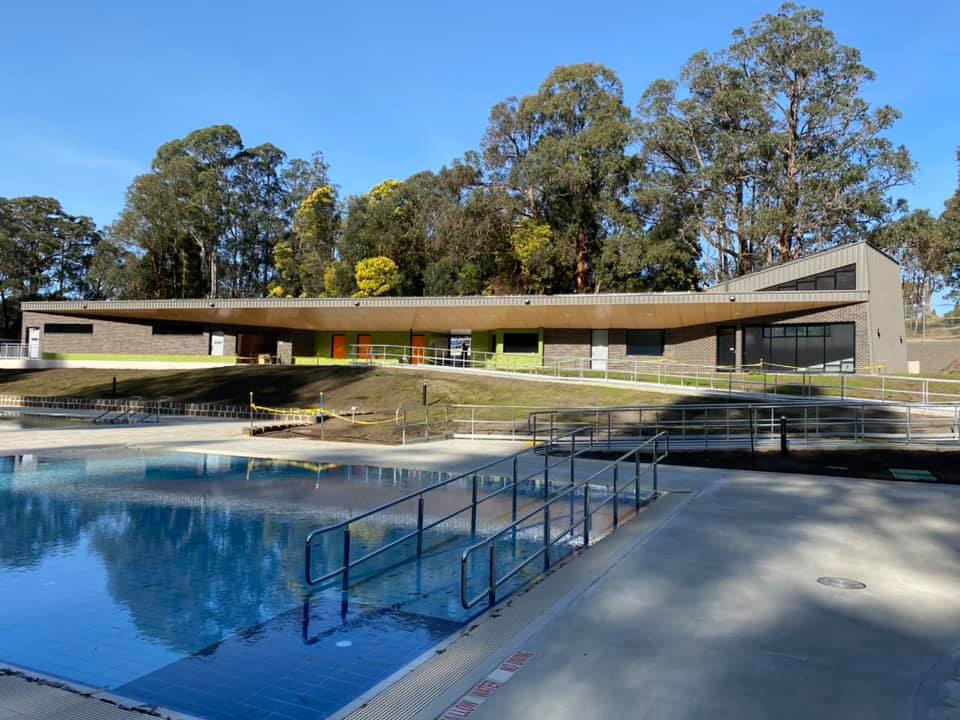
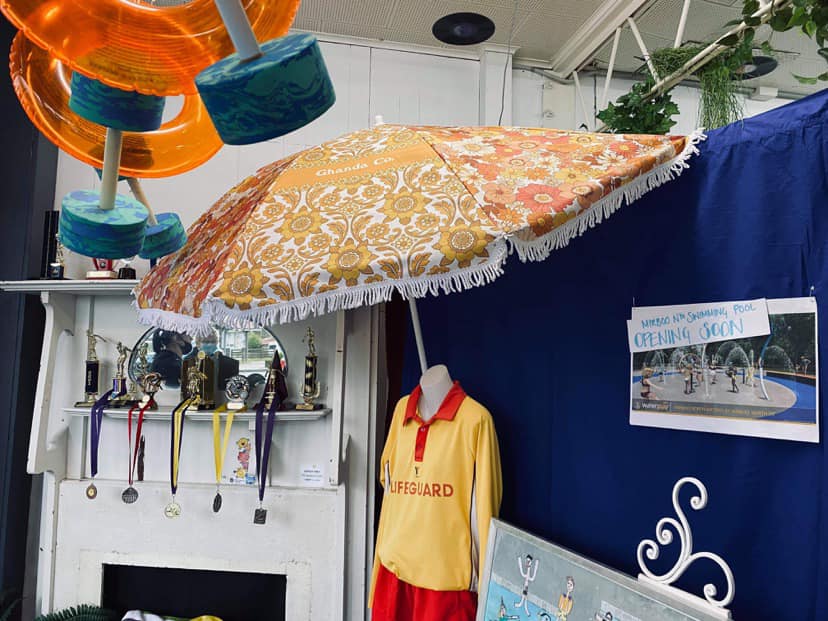 Local op shop getting the community excited for the opening of the pool
Local op shop getting the community excited for the opening of the pool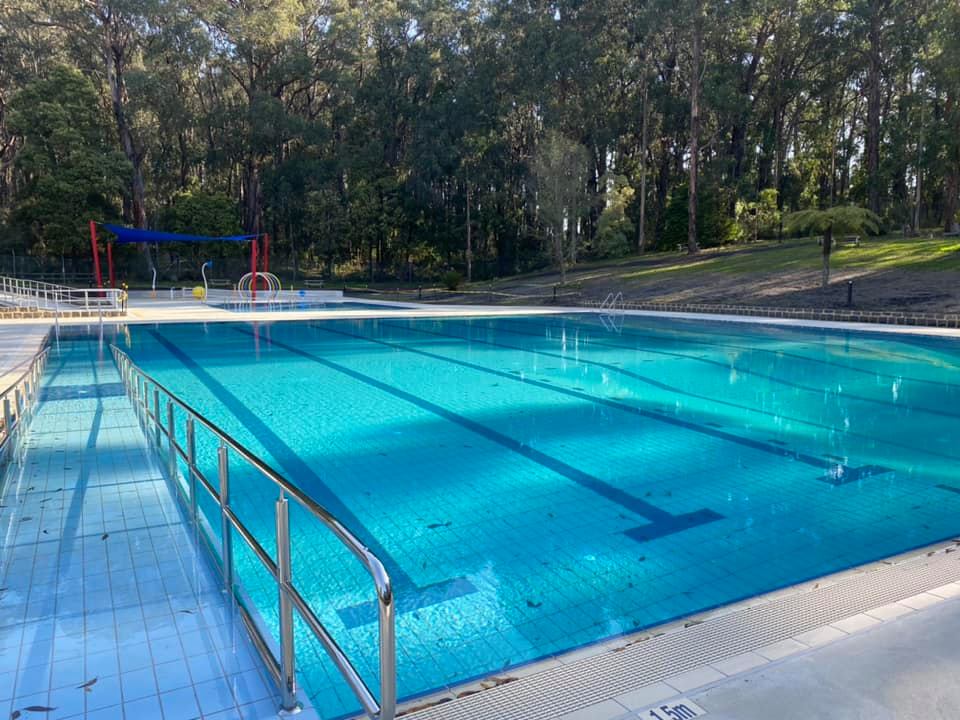
An FRRR Community Foundation Account allows organisations to leverage FRRR’s special tax status and secure donations for an agreed purpose, with FRRR providing a tax deduction for the donor where required, and the funds ultimately benefit local priority projects. It also supports Foundations to give organisations in their community that do not hold DGR-1 status.
In this last year, two projects have stood out among all the wonderful work the MNDCF does. One is building a Medical Centre for the Mirboo North community. Earlier in the year, they purchased a block of land. With this fantastic new facility, they aim to bring affordable and accessible healthcare to the region.
MNDCF also lent their support to the Mirboo North Community Pool project. This redevelopment involves updating the old pool structure and expanding it to support the community more effectively, especially through safe swimming classes and health and wellbeing activities. With an $18,000 contribution from the Foundation made possible through the Community Foundation Account, and their grand reopening scheduled at the end of October 2021, this project has all the hallmarks of success. The Mirboo North community is justifiably proud of the efforts of all involved.
MNDCF has also been a longstanding partner in FRRR’s Back to School program. Since 2012, they have distributed more than $38,000 in what has become a cornerstone of giving in the community. The Back to School program assists Australian rural and regional communities by distributing $50 vouchers to students and families in need of assistance with items like uniforms, shoes and stationery. In the 2021 program MNDCF gave out 90 vouchers to families in need across the district.
MNDCF is a shining example of how place-based philanthropy can support the growth of a community.
$2 million Fund to respond to the needs of the Clarence Valley and surrounding regions
A new partnership between the Foundation for Rural & Regional Renewal (FRRR) and The Yulgilbar Foundation will give rural and regional communities in the Clarence Valley and surrounding regions in Northern New South Wales a much-needed boost.
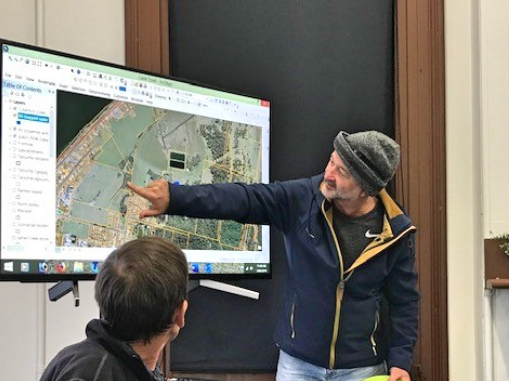
A total of $2 million will be invested across the region over a three-year period, through multi-year and one-off grants. Priority will be given to projects that are optimistic and forward-looking, led by locally-based community groups and not-for-profit organisations (NFPs).
The Yulgilbar Foundation Fund will assist community organisations to implement a wide range of initiatives. The Fund will focus on supporting projects that foster artistic collaborations, encourage educational participation, support environmental sustainability, and build capacity for communities to respond to recent bushfires and persistent drought.
Natalie Egleton, FRRR’s CEO, said that The Yulgilbar Foundation shares FRRR’s belief that local people are best placed to know what is needed to strengthen and support their community.
“Like much of rural New South Wales, the Clarence Valley has worked really hard to overcome a long run of persistent challenges, including the 2019-20 bushfires, ongoing drought, and the complexities of COVID-19. This Fund means communities can address the needs that these challenges have created, in ways that make a real difference.
“We have a long history with The Yulgilbar Foundation and look forward to seeing this Fund further strengthen communities in the Clarence Valley and beyond,” Ms Egleton said.
Community groups and NFPs can apply for the grants through an Expression of Interest (EOI) process. with Round 1 opening on Thursday 18 February.
More details, including the program guidelines and EOI form, are available here.
Yackandandah is a small town with a well-preserved history from the gold-mining boom. But it’s also forward-thinking and there was a push to be more sustainable in terms of power generation.
Totally Renewable Yackandandah (TRY) is the town’s driving force behind the push for renewables and increasing local ownership. Every year, millions of dollars leaves the town’s economy each year. TRY received $4,878 from the Australian Communities Foundation’s (ACF), through their FRRR Community Foundation Fundraising Account, to invest in community engagement and education around renewable energy hubs.
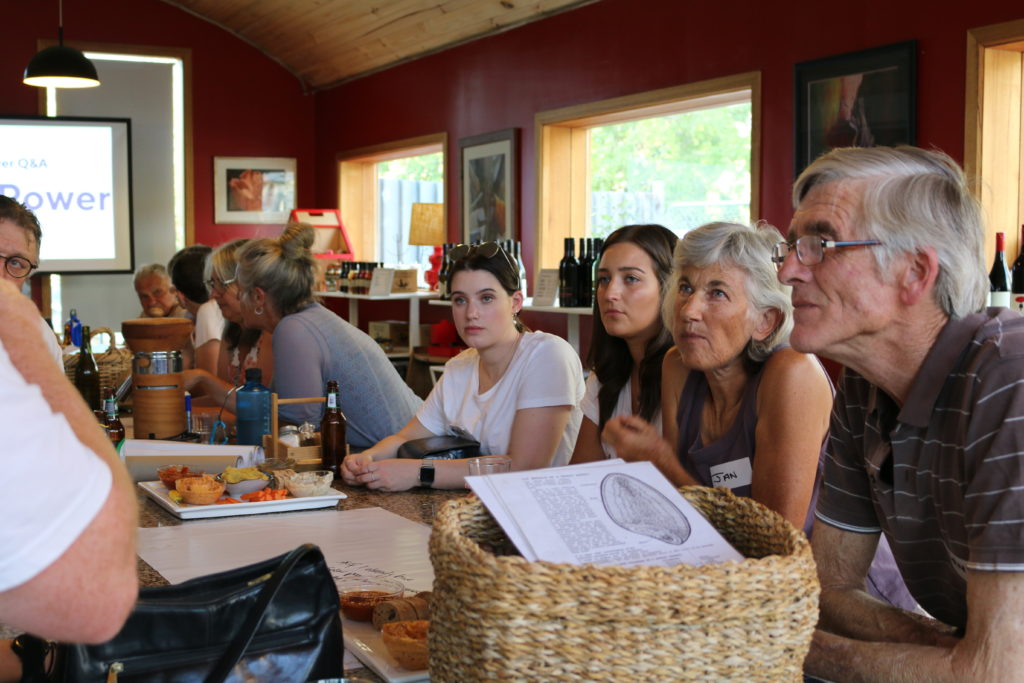
Totally Renewable Yackandandah and its partner Indigo Power, initially planned to bring locals together in a series of ‘town hall’ style events to discuss the benefits of a community solar energy hub, as well as the practical side of establishing and maintaining such a facility. While the first of these meetings went ahead, the last two events were converted to online forums due to COVID-19. Turnout was still high, with more than 500 people in total attending the events.
Cambell Klose, who has driven the community project, said the community response was phenomenal. “Every year more than $160 million leaves our region because of people paying their electricity bills; people were really excited to be part of a movement that is changing that.
“Local residents learned what a community energy hub is and how they can use solar to power our region with clean energy, and reduce their power costs. We also covered how to support and undertake community projects, like solar on town halls, to promote renewable energy hubs.”
Cambell also said that the community was very motivated by the sessions.
“Residents wanted to go away and power their local town hall with renewable energy or work to put solar on government housing. It was incredible to see so many local people come together for climate solutions.”
ACF partnered with FRRR to establish a Community Foundation Fundraising Account to streamline the process of making grants to community organisations that don’t hold DGR1 status in remote, rural or regional areas which are conducting charitable activities in line with FRRR’s purposes.
If you’d like to explore having a Fundraising Account for your community project, contact Jo Kemp, FRRR’s Philanthropic Services Manager.
Northern Rivers Community Foundation (NRCF) was established in 2004 with the purpose to connect people who care with local causes that matter, to improve community well-being for the Northern Rivers region of NSW. They provide annual grants to a wide range of community groups for projects ranging from mental health, to growing fresh food to ensure children are well nourished and can learn, to distributing Back to School vouchers. NRCF is particularly focused on supporting grand-carers, supporting riding for the disabled and palliative care.
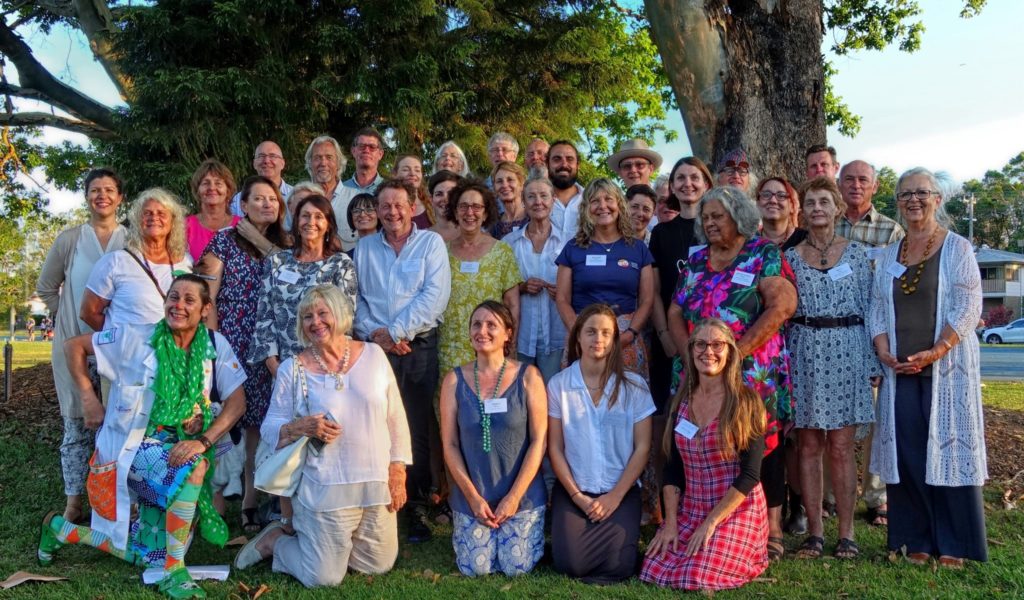
FRRR’s NRCF Community Foundation Account helps facilitate donations for a number of their partners and enables them to leverage FRRR’s tax deductible status to maximise their donations. In 2019 they distributed some $114,000 in grants including to the Bangalow Koalas to set up a wildlife corridor; provided medical equipment to Tweed Palliative Support and Wedgetail Retreat Community Hospice; enabled the Bunjum Aboriginal Corporation to refresh their unit used as a transition house for women fleeing violence; provided professional development for tutors and support workers at Sprung Integrated Dance Theatre; and supported a youth program for first offenders with NSW Police participation.
Pinery Fire response supported by Community Foundation Account
Foundation Barossa’s story is a particularly good example of how FRRR’s Community Foundation Accounts are able to help a community respond to emerging local needs quickly and efficiently. The account is flexible in the way that it can fundraise and grant funds, and direct funds toward a great variety of projects in the geographic area.
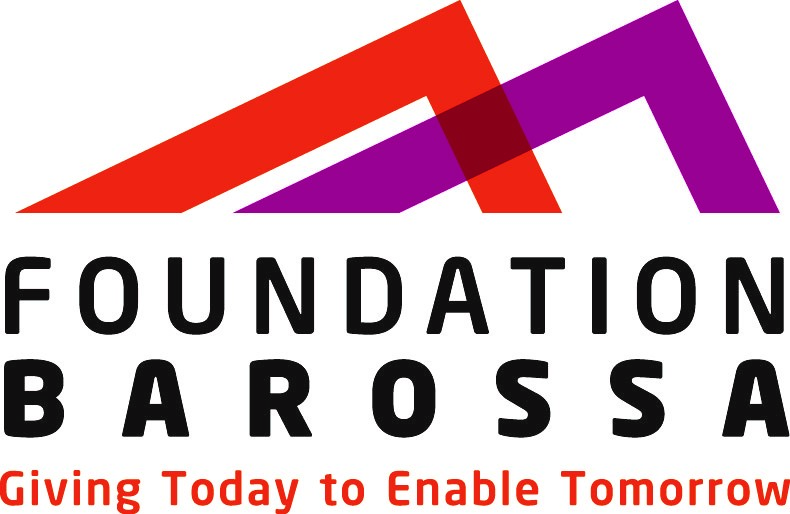
Incorporated in 2002, the Foundation was formed to fundraise and support local community projects, many of which are innovative and unique to the region. The Foundation runs an annual small Community Grants program, however many of the small not-for-profit organisations in the Barossa do not have DGR status. For this reason, Foundation Barossa opened an FRRR Community Foundation Account (formerly known as a Donation Account) to provide a way to streamline and increase the number of grants that could be allocated.
Located 50 km north-east of Adelaide, the region includes the major towns of Nuriootpa, Tanunda, Lyndoch and Angaston, and a number of smaller communities. The Foundation’s focus area for support is the sustainability of the Barossa’s environment and heritage, and the annual grants are a well-known and integral part ort of the community.
In 2015, the Foundation renewed their account – which had become inactive – to include fundraising to support fire relief and recovery after the Pinery Bushfire. The fire was devastating for the region – it burned from 25 November to 2 December 2015, destroying 91 houses, hospitalising 90 people and killing two.
With the help of FRRR’s DGR status, this Community Foundation has been able to fundraise for and support a great variety of wonderful community projects, including purchasing equipment for educational programs, upgrading vital community infrastructure, providing transport services for cancer patients, enabling garden revival projects, constructing memorials for the two local individuals who lost their lives, and publishing a book recording historical information from the area.
Below is a summary of projects that are being supported in the region through the granting of almost $50,000 via the Account.
Bushfire Garden Revival
The goal of SA Bushfire Garden Revivals is to assist as many impacted families to rebuild their home gardens as possible. Garden therapy offers significant health and wellbeing benefits and helps recovery from trauma, through both distraction for families and regeneration of land. Following the Pinery bushfire, the Samson Flat Garden Revival team restructured their project to assist any South Australian bushfire event, quadrupled their team, and grew rapidly with a new focus on assisting Pinery families.
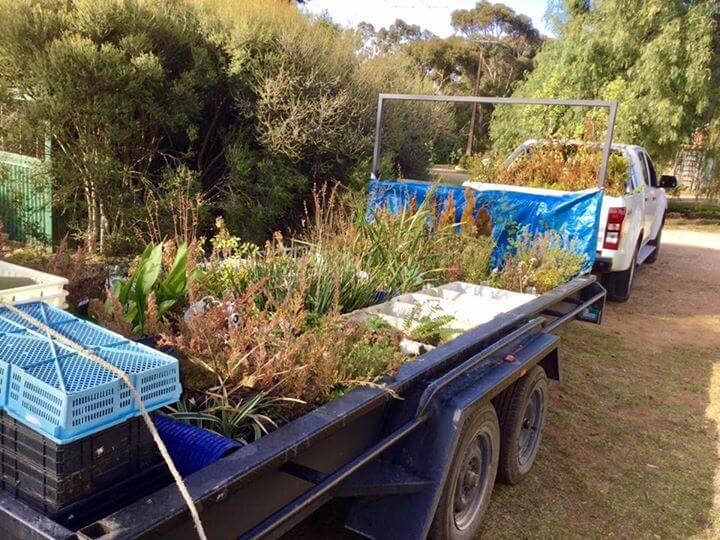 |
They went from 3 collection points for donations to 11 around the State. Funds are used to purchase garden items such as tools, greenhouses, garden statues, native plants, fruit trees and citrus trees. The number of families who lost their home gardens is far greater than the number of homes lost overall, and gardens are mostly uninsured and impossible to put a dollar value on. Through providing assistance, plants and garden items to fire affected families, the SA Bushfire Garden Revival team hopes to share their experience in garden therapy and horticulture to assist them to rebuild their home gardens with colour, love and life.
The Barossa – From Federation to the Fifties
 |
The Regional Heritage Network was granted funds to coordinate a publication of the book ‘The Barossa – From Federation to the Fifties’. Local historians formed a working group to write the book, which will be a companion volume to the successful 1992 publication The Barossa – A Vision Realised, which focused on the settlement history from 1839 to 1900. The next 50 years – from 1901 to 1950 – outlines the progress of the Barossa region, the people and its culture. It is to be published in October 2017 to commemorate the 175th anniversary of settlement in Angaston and Bethany and other townships over the next ten years.
iPads as sensory tools for behaviour management in special needs kids
The Barossa Outside School Hours Care Service wanted to ensure that they are accommodating for the high level needs of special needs children in their care. The two iPads that were purchased – one at each of their sites in Nuriootpa and Tanunda – will be used as sensory tools to enhance communication with non-verbal autistic children. The iPads can also be used for managing high-level behaviours in children that are a safety risk to themselves and others, and require distraction and calm down time.
A seat for Janet
Hamley Bridge Community Association was supported with funds to construct a memorial piece to commemorate the life of Janet Hughes, a community-focused, caring individual who was one of two people who perished in the Pinery fire storm on 25 November, 2015. Janet had opened up the Hamley Bridge Institute on the day of the Pinery fire storm to give refuge to community members who were looking for a safe haven, before becoming trapped in her car. A mosaic reflection bench in Janet’s favourite colour is to be erected to acknowledge and respect Janet’s selfless actions that showed her community spirit. You can find a video of the community’s involvement in the project here.
 |
Landscape Greening Project
The Owen Uniting Church’s Landscape Greening project will provide $100 vouchers to a local garden centre for the families who had gardens burnt but were lucky enough to save their homes. Members of the church are distributing the vouchers personally, first visiting homes in the reguib the fire started, and moving east as money is raised for further vouchers. This small gesture will enable fire-affected families to purchase tools, native plants and trees to rejuvenate their destroyed garden areas and provide hope, new life and distraction, literally in their backyards.
Wasleys Supper Hall
The recently renovated / refurbished Wasleys Supper Hall has been an invaluable community asset since the Pinery Fire. It was used as the local Recovery Centre immediately following the fire, assisting those from Wasleys and District. It provided access to physical goods (food, clothing, bedding, crockery, cutlery etc) and also provided a space for people to come and have a cup of tea and a chat if that’s what they needed. The Supper Hall is also used on a regular basis by lots of local groups including Creative Chatters (a group that was formed post-fire to assist mainly women from the fire region), and by the Wasleys Community Group Inc for meetings. The Hall is hired out privately on ad hoc occasions.
 |
As the Supper Hall has no heating or cooling, it is extremely cold during the cooler months and very hot during the warmer months. The Community Foundation Account is supporting the installation of reverse cycle air conditioning to make the space much more comfortable and even more attractive to users.
Cancer patients’ ‘Butterfly Car’
The Barossa Area Fundraisers for Cancer were supported by the Community Foundation to provide signage and decoration for their cancer patient transportation – the Butterfly Car. The butterfly decoration gives it great visibility and the vehicle is well recognised. This important community service stepped in to cover the total cost of transport for patients on their way to hospital for treatment, after a government subsidy for this transport ceased.
Owen Men’s Shed and Alan Tiller Memorial
The Owen Men’s Shed began construction in October 2015, and completion of the shed itself was just prior to the Pinery Fires occurring in November 2015. Alan Tiller was one of the men instrumental in both the building of the shed and the development of the organisation in Owen. Alan lost his life battling the blaze in the Pinery fire.
There are around 15 members of the Owen Men’s Shed from communities that have been impacted by the fires. The Foundation is supporting upgrades to the current shed, including stormwater connection, equipment and materials for projects, as well as a memorial for Alan Tiller.
Freeling School Mosaic
Following the Pinery fire, staff and students at Freeling Primary School devised a project to create a series of mosaics with images celebrating the Freeling Community. The project would involve staff, interested students and members of the community. This project will help the students to move on from the bushfires and heal through creativity.

